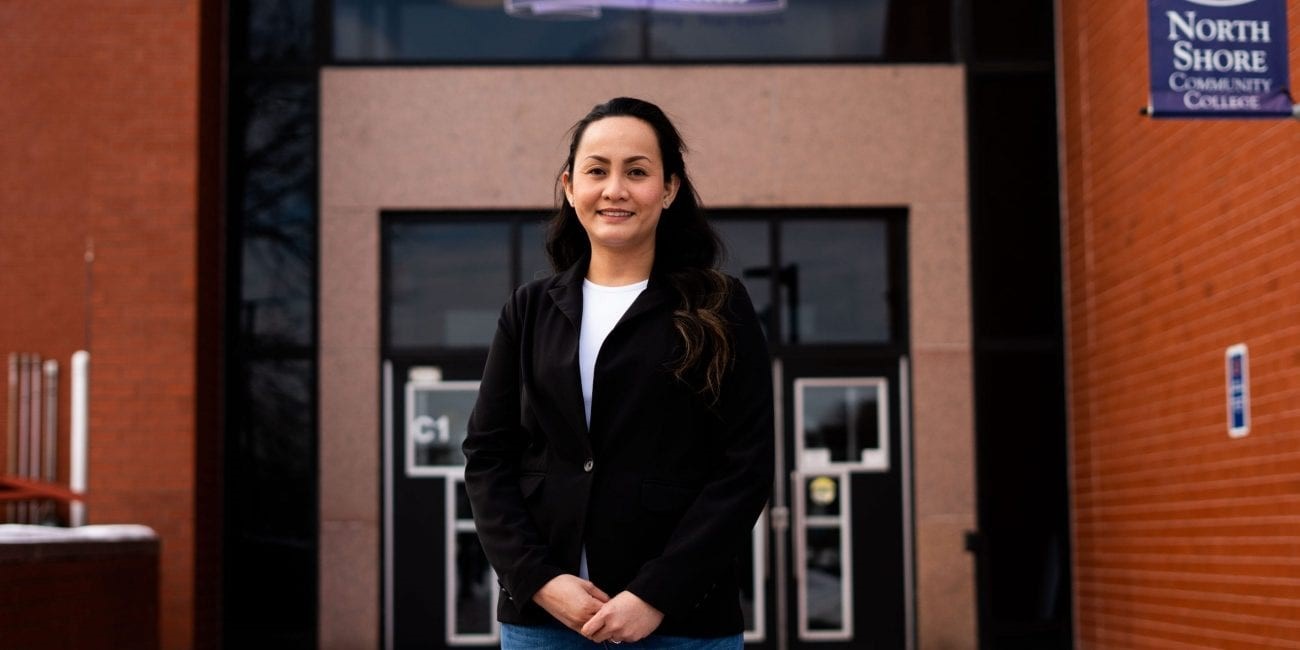February 14

Swampscott resident Kristina Bowen, a computer networking student at NSCC, participated in the Mass Cybersecurity internship with the Mass Tech Collaborative last fall. (Julia Hopkins)
The MassCyberCenter at the MassTech Collaborative is currently accepting applications for the second edition of its Cybersecurity Mentorship Program, beginning in March.
The mentorship is a three-month program that pairs diverse students from around the state with skilled mentors working in the cybersecurity field in hopes to increase the diversity within the cybersecurity workforce.
The program began last September with 10 students and mentors that were paired based on similar interests and experiences. Students met with their mentors virtually at least once a week, getting to know each other in preparation for their collaboration on the final project. Students can choose what kind of project they would like to work on, including building, breaking and fixing something or creating something to show cybersecurity vulnerability.
Danielle Helm, MassCyberCenter director, hopes that the program will encourage students to take a job in cybersecurity after graduation.
“You can connect with your mentor on LinkedIn, and there’s usually a network of folks that the mentor is already engaged with,” Helm said. “Your mentor can give you recommendations on where to apply, what kind of positions, and may directly pass your resume onto a friend in human resources.”
Kristina Bowen, of Swampscott, was a student in the pilot program and is happy that the program introduced her to her mentor, Erik Burns, who is a senior solutions engineer at Rapid7, and other professionals that she otherwise wouldn’t have had the opportunity to meet.
“I still talk to him (Burns) and I can contact him anytime for questions,” she said. “He emails me programs like this to learn from and really wants me to excel in the IT field.”
Bowen is a second-year computer networking student at North Shore Community College. She heard of the program from her advisor, Professor Huiwei Guan, and knew that it was an opportunity she couldn’t pass on.
“I liked the program because I was learning new classes for free and at the same time, being mentored by someone successful,” Bowen said. “He was very supportive with the project and ideas. He was always asking if I needed help and was okay.”
Working with the mentors ensures the students exposure to incident response planning within cybersecurity. Helm believes this is an important aspect in this field.
“Coming from the navy, my background taught me that you should always have a plan. It isn’t that the plan might be perfect and cover all aspects, but it helps better understand what the issues may be,” said Helm.
Bowen recommends the program and credits it for expanding her interest in network security and increasing her desire to pursue that field after graduation.
“My favorite part about this program was learning something new in a fun way. If you just study this in class it tends to be boring. In the program, you have a direct contact, a mentor that is telling you how to do it,” said Bowen. “You’re learning it on your own but you have someone there to help you succeed.”
There is a big demand for cybersecurity talent in Massachusetts, especially with everyone relying on the internet for work and remote learning, Helm said.
“Cybersecurity is critical to being able to live through this pandemic,” said Helm. “If people were unsure if it’s worth their time to think about cybersecurity, over the last few months they see it now.”
There has been a recognized lack of diversity throughout the cybersecurity sector. Only about five percent of workers in the field are Black, seven percent are Hispanic and only one-third are women, according to the Massachusetts Technology Leadership Council.
Bowen is an example that cybersecurity is an option for women as well as men.
“I really want to pursue network security. This program unraveled what I wanted and loved,” said Bowen, who was working, taking three classes and involved in the program while still managing to successfully maintain the meetings and project requirements.
Projects are presented, virtually, at the end of the program and include greetings and congratulations from the mentors and professionals including Damon Cox, assistant secretary of technology, innovation, and entrepreneurship for the Commonwealth of Massachusetts, and Carolyn Kirke, the executive director of the Massachusetts Technology Collaborative.
Applications can be found online at https://masscybercenter.org/mentorship and are due by February 17.
By Allysha Dunnigan, February 14, 2021, Lynn Daily Item
